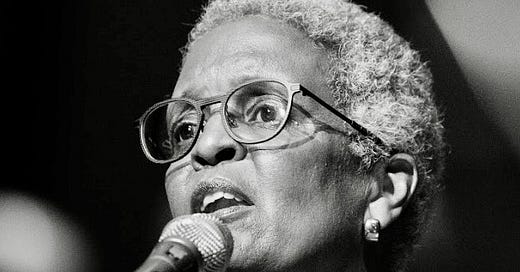Behind The Scenes with an ambitious [b]old woman
On the podcast, my Harvard classmate and I reflect on our 50th reunion and how life unfolds in surprising ways.
🎙️This is Season 6 of my [B]OLD AGE podcast. Thank you for listening! I interview authors, experts, and exceptional individuals to reveal the truths about [b]oldly moving from midlife to old age, in a society that devalues old people. I also invite my husband on as a frequent guest. He’s a retired physician with a dry sense of humor and he makes me laugh. You can find over 100 previous episodes on Apple podcasts or on my website.
🎙️ Listen to today’s new episode of [B]OLD AGE
S6-EP4: Winifred White Neisser on Ambition, Embracing 70, and What Comes Next
And now, Behind The Scenes of this episode…
Wini, as her friends call her, is very modest. She doesn’t think of herself as a [b]old woman. So it took me a while in this interview to get her to talk about her success as a television executive. Even though she and I are college classmates — both looking forward to our 50th Harvard reunion — I didn’t know the details of her impressive career. She capped her 34 years in the entertainment industry as Senior VP of Sony Pictures for Television Movies and Miniseries. Her award-winning projects include the movie A Raisin in the Sun for ABC and Call me Claus, a Christmas movie which starred Whoopi Goldberg.
It’s her Midwestern upbringing, Wini told me. They don’t brag or show off in Milwaukee, WI where she grew up. (The same is true of my husband, Sam Harrington, who is also from Milwaukee.) She was never propelled by ambition, she told me. Nor did she plan out next steps as she rose to her position as a top exec. But it wouldn’t be accurate to say that her career “just happened” and that she wasn’t ambitious.
This interview is a story of quiet capability and determination - and underneath, a fierce drive. I’m fascinated by my classmate Wini’s story because, with one exception, it’s so different from mine. I married at the absurdly young age of 21 (I was a junior at Harvard, with one more year to go before graduation). I had my first baby at 25 and two more by age 31. Wini married much later and had her two children in her mid 30s, all the while climbing the TV executive ladder, first at NBC and later at Sony.
In contrast, my early motherhood derailed my career in journalism. I was married to a busy young doctor so someone had to hold down the fort at home. I stepped willingly into that role, but felt a good deal of frustration trying to work part-time as a freelance journalist. Underneath, I had the same fierce drive that Wini had. I just couldn’t express it, career-wise, until some years later.
As our conversation continued, I realized that fierce drive and determination sum up the common thread I share with my female classmates from the Harvard/Radcliffe Class of 1974. There were only 300 women (Cliffies, as we were called) in a class of 1,500 students. So we were vastly outnumbered. We were polite about it, but we were all determined to be successful in our chosen fields — both in Harvard’s male-dominated classrooms and later in the world of work.
And now here we are a half century later, talking to one another from opposite coasts, finally with the time and space to reflect on our careers and lives — and how much has changed for women in the past 50 years. Gender roles have changed: it’s not uncommon for a woman to be the breadwinner and for her husband to stay home with the children. Women’s identity has changed: you no longer need to be married or have children to have a complete and satisfying life. And so much more.
This conversation with Wini is the first of several I am planning with these [b]old women, my Radcliffe1 classmates, in honor of our upcoming 50th reunion and to explore the many changes in women’s lives.
I hope you’ll listen to this compelling interview with Winifred White Neisser and I look forward to your comments.
If you are a woman over 60, how have societal changes impacted you in the past 40 - 50 years?
If you’re a man, how have women’s changing roles affected you?
Tell me in the comments.
If you are a woman over 60, how have societal changes impacted you in the past 40 - 50 years?
If you’re a man, how have women’s changing roles affected you?
Further listening
🎙️ Here’s a podcast interview with another accomplished woman from the Harvard/Radcliffe Class of 1974.
From Season 4: A’lelia Bundles on Legacy, Leadership, and Growing Bolder at 70
This is a simplified explanation as it’s a bit confusing. Radcliffe was the name of the women’s college that was part of Harvard in the 1970s and earlier, so technically the women of my class attended Harvard/Radcliffe. Radcliffe College has now been subsumed by Harvard. And the ratio of women to men in a Harvard class is now 50-50. So things have changed dramatically over the past 50 years.
![[B]OLD AGE with Debbie Weil](https://substackcdn.com/image/fetch/$s_!i8Z0!,w_80,h_80,c_fill,f_auto,q_auto:good,fl_progressive:steep,g_auto/https%3A%2F%2Fsubstack-post-media.s3.amazonaws.com%2Fpublic%2Fimages%2Fdaaca764-d8d6-4a1b-bf58-61dbb72810fc_842x842.png)
![[B]OLD AGE with Debbie Weil](https://substackcdn.com/image/fetch/$s_!fEcd!,e_trim:10:white/e_trim:10:transparent/h_72,c_limit,f_auto,q_auto:good,fl_progressive:steep/https%3A%2F%2Fsubstack-post-media.s3.amazonaws.com%2Fpublic%2Fimages%2F95ad4442-e435-4ebc-a8d2-9c9b89a8bdb6_2100x400.png)

![[B]OLD AGE with Debbie Weil](https://substackcdn.com/image/fetch/$s_!i8Z0!,w_36,h_36,c_fill,f_auto,q_auto:good,fl_progressive:steep,g_auto/https%3A%2F%2Fsubstack-post-media.s3.amazonaws.com%2Fpublic%2Fimages%2Fdaaca764-d8d6-4a1b-bf58-61dbb72810fc_842x842.png)



There has been a physician or surgeon in every generation of my mother’s family tree since Edward Reynolds co-founded what is now Mass. Eye and Ear in 1824. The changing role of women in medicine allowed me to retire early, in part because I was satisfied that my legacy would be burnished by my daughters (one physician and one surgeon) carrying on that tradition.